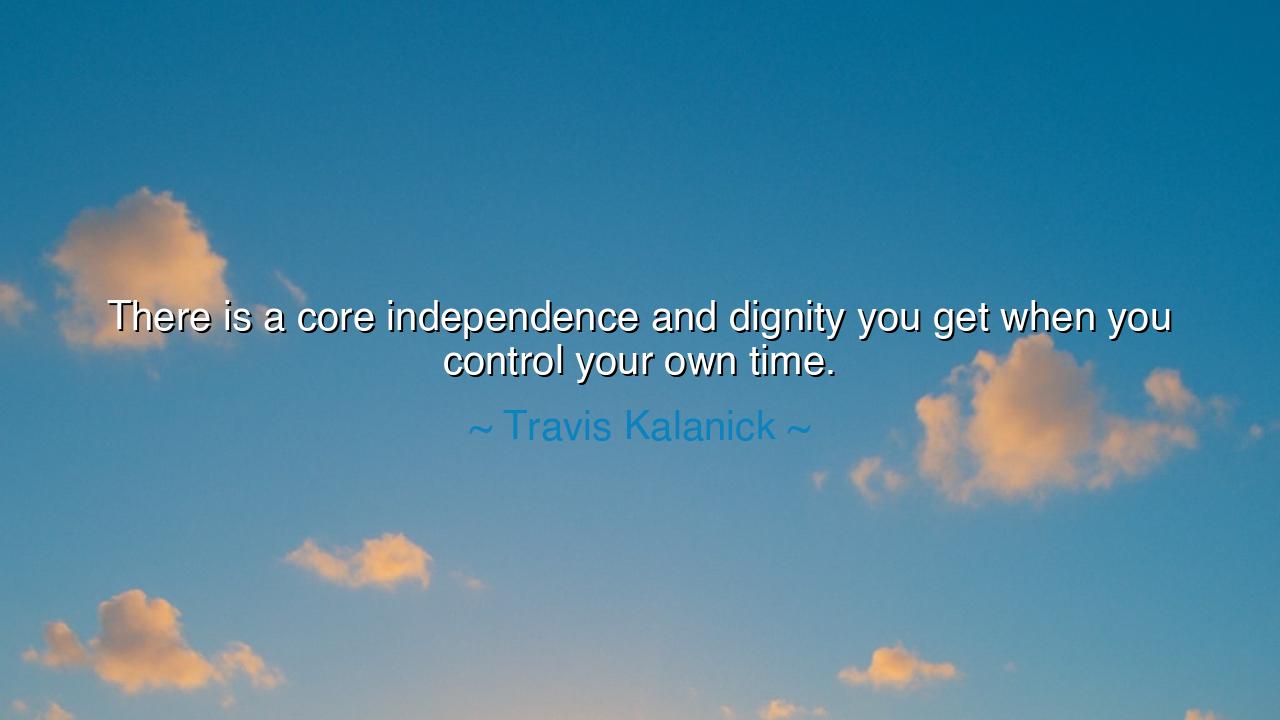
There is a core independence and dignity you get when you control






The words of Travis Kalanick, when he said, “There is a core independence and dignity you get when you control your own time,” strike like a quiet revelation in an age that worships speed but forgets stillness. Beneath these words lies an eternal truth, one that the ancients knew well — that freedom is not merely the absence of chains, but the mastery of one’s own hours. Time is the currency of life itself; he who governs his time governs his destiny. To command one’s own day, to choose one’s labors and one’s rest, is to reclaim the sacred dignity that the rush of the world so easily steals.
Kalanick, the founder of Uber, spoke from a world that thrives on innovation and ambition — a world where minutes are measured in profit, and schedules in success. Yet even in that ceaseless realm, he recognized a deeper hunger: the longing for independence, for self-direction, for control over the most precious resource we possess — our time. He saw that true empowerment does not come merely from wealth or technology, but from autonomy — from the ability to decide when to rise, when to work, when to breathe, when to live. The dignity of man begins when he becomes the master of his own rhythm, no longer bound by the demands of others, but guided by the compass of his own will.
The ancients, too, knew this wisdom. In the days of the Roman Republic, there lived the philosopher and statesman Cicero, who once retired from public life to his villa outside Rome. He had spent decades in the storm of politics, bound by duty and ambition, his time consumed by the service of the state. But in his later years, he discovered the peace of solitude and contemplation. “To be free,” he wrote, “is to belong to oneself.” In that solitude, he found that his truest wealth was not his power nor his fame, but the ability to choose how to spend his time — to read, to think, to walk among his gardens, and to converse with the silence of eternity. His independence of time became the foundation of his wisdom and his serenity.
Yet Kalanick’s reflection carries a paradox as old as progress itself. He built a company that promised millions the power to “be their own boss,” to work when they chose — a vision of freedom through flexibility. But he also witnessed how easily the pursuit of efficiency can enslave the very people it claims to free. For to control time, one must first learn to control oneself. Without discipline, freedom decays into chaos; without purpose, autonomy becomes emptiness. The lesson is clear: independence of time must be married to dignity of purpose, or else it will slip through our hands like sand.
Think also of Mahatma Gandhi, who waged not only a political revolution but a personal one. He believed that the highest form of freedom began within — through self-control, through simplicity, through mastery of one’s own desires and schedule. Each morning, he rose with the sun, dedicating his first hours to prayer, reflection, and work. To him, the ability to direct one’s time was a sacred duty. It gave him clarity, strength, and moral independence even under the chains of colonial rule. He proved that when one commands his time, even the most powerful empire cannot command his soul. Dignity, therefore, is not found in the abundance of hours, but in how one chooses to fill them.
Kalanick’s words also speak to the human yearning for balance — a harmony between work and rest, between striving and being. In our age, we are told that success belongs to those who never stop, who sacrifice every hour on the altar of ambition. Yet in truth, the opposite is often so: those who lack control of their time become slaves to their own pursuits. They may own companies or titles, but they do not own themselves. To be rich in time is to be rich in life. To be poor in time — even amidst wealth — is to live impoverished in spirit. For every human being, from the laborer to the leader, the question remains the same: Whose time do you live — your own, or another’s?
So, O listener, take this wisdom to heart. Guard your time as a warrior guards his sword — for once it is taken, your power is gone. Do not squander it on things that do not honor your purpose. Rise each day with intention, and ask yourself: “Who commands my hours?” If it is fear, ambition, or habit that rules you, then reclaim your throne. Make your time serve you, not enslave you. For within the rhythm of your hours lies your independence, your dignity, your very life.
Thus, the teaching of Travis Kalanick endures: that to master time is to master the self. The measure of freedom is not in possessions or praise, but in the quiet sovereignty of one’s own day. When you decide how to spend your moments — when you live not by compulsion, but by choice — you rise to the level of kings and philosophers alike. Live, then, with deliberate rhythm. Work with passion, rest with grace, and let no hour be wasted on things unworthy of your soul. For as long as you command your time, you shall never be truly bound.






AAdministratorAdministrator
Welcome, honored guests. Please leave a comment, we will respond soon